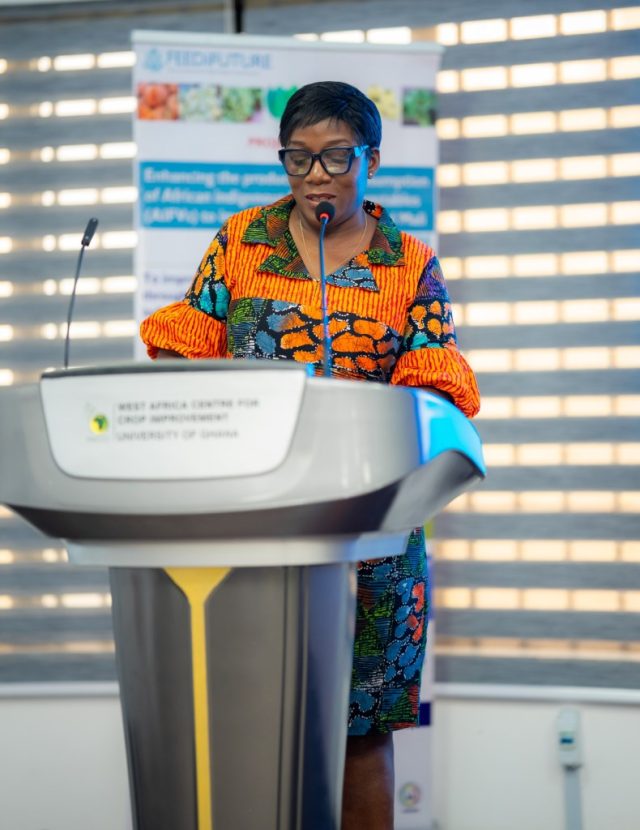By: Rachel Kakraba
A Postharvest Technology Specialist, Department of Crop Science, University of Ghana, Dr. Gloria Essilfie, has rallied support of the private sector to partner academia in implementing research findings. This she said is critical to national development as many valuable research outcomes which could propel national development remain untapped.
Dr. Essilfie who is Project Lead, “Enhancing the production and consumption of African indigenous fruits and vegetables (AIFVs) to improve diets in Ghana and Mali, was speaking to GBCNEWS, during a recently held validation workshop and policy dialogue on enhancing consumption of indigenous fruits and vegetables to improve diets in Accra.
With funding from the Feed the Future Innovation Lab for Horticulture, the University of Ghana is collaborating with the Forum for Agricultural Research in Africa, FARA, to implement various activities and engagements to promote the production and consumption of indigenous vegetables and fruits in Ghana and Mali. The goal is to improve the nutritional status of Ghanaians and Malians by encouraging the use and consumption of local fruits and vegetables.
Dr. Essilfie, said under the project some nutritious products are being developed which would require such critical collaboration to promote acceptance and consumption for the general well-being of citizens.
“Research is doing its bit, we hope that there’ll be the buy in of the private sector so that they would also promote these commodities so that we can consume them”
She hinted that the project would produce a food composition table, detailing the nutritional value of different fruits and vegetables to promote their consumption among the population in the project countries.
“We are all saying it’s nutritious, but how nutritious? So we will have the data to show to people that it’s nutritious. Then when it comes to policy, we can actually show them that this is the data”
Dr. Essilfie, also mentioned that under the project grants will be offered to youth and women led enterprises to expand their businesses. She explained that, “We’ll put an advert out for these enterprises mainly for women and the youth who would apply. If their business plan is good enough around these indigenous crops, we support them with 10, 000 dollars to help set up their business, but they have to already be in the business of producing something so that when they apply and get the money they just continue with what they are doing and work to promote the consumption of these indigenous crops”
The three year project she added will also train farmers to empower them to improve their livelihoods.
“After we’ve done the value chain where we have interacted with them, we now go back and say, we are training based on what we found in the value chain. We are training you on what you don’t have so that you will be able to use that to improve your own livelihood”
Executive Director, Forum for Agricultural Research in Africa, FARA, Dr. Aggrey Agumya, stated that investing in indigenous fruits and vegetables will strengthen the resilience of the country’s food system.

“Indigenous, fruits and vegetables are also essential in strengthening the resilience of our food systems. They are important as potential opportunities for generating revenue for especially for our farmers”
He said the African Union Commission and the African Union Development Agency, which are the top political organs on the continent are crafting the next phase of the Comprehensive African Agriculture Development Program, which will guide agricultural development on the continent. The framework which he said will be implemented from 2026, will strongly feature indigenous fruits and vegetables.
“Resilience is a big part of the coming agenda and recommendations have been crafted calling for the integration of indigenous food systems and knowledge into national and regional food and nutritional security plans and resilience plans.”
Dr. Agumya, also emphasized the need for stronger collaboration between research, academia, particularly at country level, for maximum benefits.
The Forum for Agricultural Research in Africa (FARA) is the apex continental organization responsible for coordinating and advocating for agricultural research for development. FARA serves as the technical arm of the African Union Commission on matters concerning agriculture science, technology and innovation.








![[VIDEO] Agya Koo celebrates like Cristiano Ronaldo after scoring penalty](https://ghananewss.com/storage/2023/02/BeFunky-collage-2023-02-17T164545.706-scaled-100x75.jpg)








